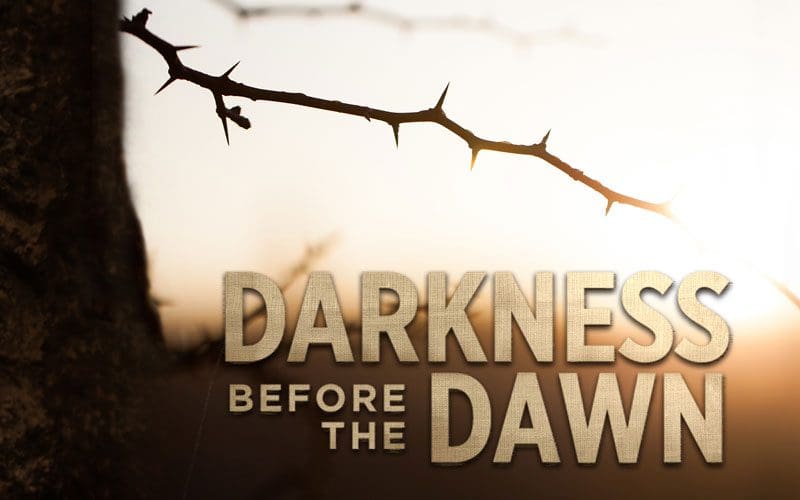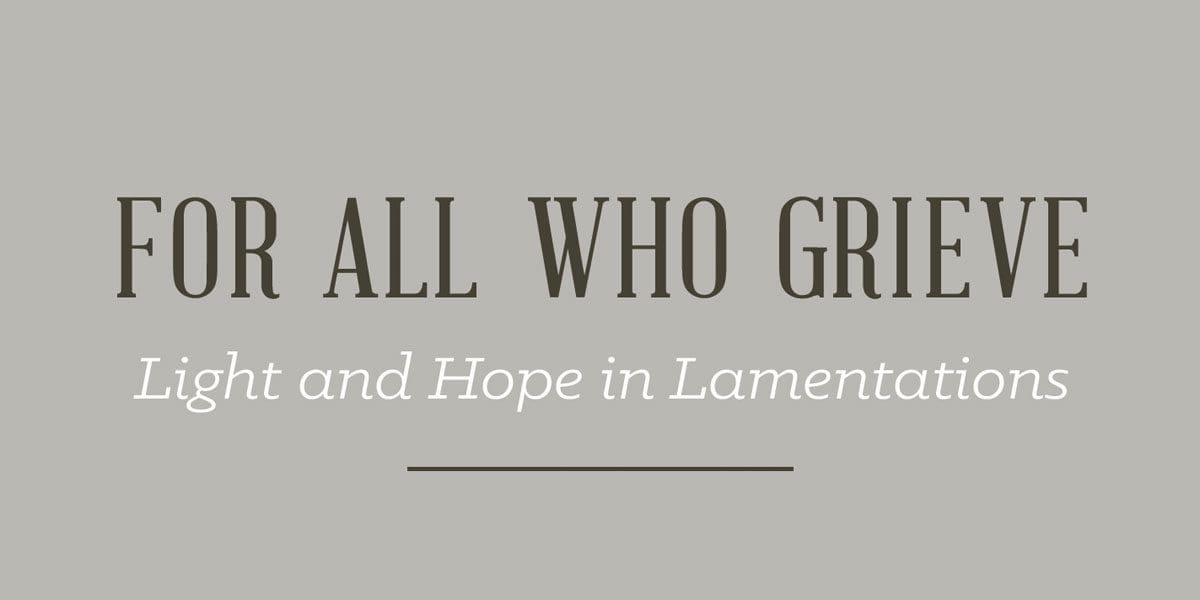While he was still speaking, Judas came, one of the twelve, and with him a great crowd with swords and clubs, from the chief priests and the elders of the people. (Matthew 26:47)
In these weeks leading up to Easter we are looking at the events that took place on the night before our Lord Jesus was crucified. Our series is called “Darkness Before the Dawn.”
The dawn came in the triumph of that Easter morning, when Christ rose from the dead. But before the dawn there was great darkness, and the darkness began, not when Jesus was nailed to the cross, but on the night that our Lord was betrayed.
We began our journey last week, looking at our Lord in the Garden of Gethsemane, where he wrestled in agony over the prospect of the cup. “My Father, if it be possible, let this cup pass from me; nevertheless, not as I will, but as you will” (Mat. 26:39).
When Jesus stared into what it would mean to bear sin, to be forsaken by the Father, and to endure the divine wrath, it filled him with horror. But Jesus chose the will of the Father over the inclinations of his sinless humanity: “Shall I not drink the cup that the Father has given me?” (John 18:11). “Your will be done” (Mat. 26:42).
The darkness before the dawn began with Jesus’ prayer in the garden. It continued through the night with his arrest and his trial. It deepened at nine o’clock the next morning when, having been scourged, our Lord was nailed to the cross. And it lasted until three o’clock in the afternoon, when Jesus cried out, “My God, my God, why have you forsaken me?” and then, “It is finished! Father, into your hands I commit my spirit.”
Today we come to the second step that our Lord took into the darkness with the story of his arrest. Please open your Bible at Matthew 26.
The Story of Jesus’ Arrest
Then [after submitting himself to the cup and praying for a third time] he [Jesus] came to the disciples and said to them, “Sleep and take your rest later on. See, the hour is at hand, and the Son of Man is betrayed into the hands of sinners. Rise, let us be going; see, my betrayer is at hand” (Matthew 26:45-46).
A supreme irrelevance
Matthew tells us that Judas had given a sign: “The one I will kiss is the man; seize him” (26:48). Verse 49 tells us that he came up to Jesus and kissed him.
In our world of television and instant communications on social media, we are familiar with the faces of people who are in the news. But many of the soldiers who were dispatched from Pilate’s garrison would never have seen Jesus before, and would have had no idea how to distinguish him from the rest of the disciples.
When they arrived in the garden to make the arrest, it would have been easy for one of the disciples to step forward. They needed to be sure that they were arresting the right person.
The arrest was being made at night, and if Judas had relied on pointing to Jesus in the darkness, there would have been room for confusion, especially if the disciples started running in different directions. So he settled on a sign that could not be mistaken. He would go up to Jesus and kiss him (26:48).
When we looked at the story of Judas last year, we saw that this sign turned out to be a supreme irrelevance. John tells us that when the crowd armed with swords and clubs arrived in the garden, the first thing that happened was Jesus stepped forward and asked, “Whom do you seek?” “Jesus of Nazareth,” they said, to which our Lord replied, “I am he” (John 18:4, 5).
So before Judas kissed the face of Jesus, our Lord had already identified himself to the arresting party. This moment, for which Judas would always be remembered, was a supreme irrelevance. The kiss achieved nothing, except to confirm Judas’ defection from being a follower of Jesus.
I want to focus today on the events that followed the kiss. “Then they came up and laid hands on Jesus and seized him. And behold, one of those who were with Jesus stretched out his hand and drew his sword and struck the servant of the high priest and cut off his ear” (Mat. 26:50-51).
John tells us that it was Peter who drew the sword, and that the name of the High Priest’s servant was Malchus (John 18:10). The word used here to describe Malchus is the Greek word doulos which means a slave. So we have a sword, a slave, and the Savior.
Christ rebukes the sin committed by his disciple
“Put your sword back into its place” (Matthew 26:52).
The other gospels fill out the picture of what happened here.
- Luke tells us, “When those who were around him saw what would follow, they said, ‘Lord, shall we strike with the sword?’” (Luke 22:49).
- Peter did not wait for the answer and Matthew tells us that he “drew his sword and struck the servant of the high priest and cut off his ear” (Matthew 26:51).
This was an act of violence that Peter surely intended to be lethal. Peter’s sword would have been a two-handed weapon, and there is no doubt in my mind that Peter was aiming to split the head of Malchus, but he missed by a few inches and cut off the slave’s ear!
What we have here is the truthful record of a brutal act of violence perpetrated by a follower of Jesus. No issue is more prominent in our world today than the issue of religious violence: Violence perpetrated in the name of God, by people who profess religious faith. Here we have a story of a man of faith, not from another religion, but a follower of the Lord Jesus Christ who lashes out in an appalling act of violence, striking at someone’s head with a sword.
So we are confronted with two questions: What lies at the roots of violence, especially in a person who professes faith? What does Jesus say and do about this appalling act of violence?
Roots of Violence
i. Misguided loyalty
Peter feels that he needs to defend his Lord. He feels that a great injustice is taking place, and of course, it is a great injustice. He is a man of action and so he feels that he must do something about it, even if it costs him his own life. But Jesus says, “Do you think that I cannot appeal to my Father, and he will at once send me more than twelve legions of angels?” (Mat. 26:53). “Peter, I don’t need you to defend me, so put away your sword.”
Al Mohler pointed out in his podcast, The Briefing, that there is a great difference between Christianity and Islam on the question of honor. “Christianity is not an honor religion. Faithfulness to Christ does not mean that we have the responsibility to defend Christ’s honor against his enemies. Indeed we preach Christ; Christ himself will defend his own honor.” [1]
That’s what a sovereign God does. If you’re defending a tradition, you have to defend its honor. But you have a living Lord. One day every knee will bow and every tongue confess that Jesus Christ is Lord.
ii. Unrestrained anger
There was reason to be angry. This arrest, made at night, with a great crowd armed with swords and clubs was an outrage. Peter’s rage would have boiled over at the sight of Judas leading the crowd and then planting a kiss on Jesus.
I assume that Peter struck Malchus, because Malchus was the closest person to him, and that Judas would have been next if our Lord had not intervened. But Jesus gives the clearest command: “Put your sword back into its place (Mat. 26:52), Peter, this is not what you do with your anger.”
iii. Unresolved guilt
Here we come to perhaps the deepest root of violence, especially in a person who professes faith. Remember, Christ had just given Peter a specific command and he had failed to carry it out. “Taking with him Peter and the two sons of Zebedee… he said to them ‘My soul is very sorrowful, even to death; remain here, and watch with me’” (Mat. 26:37, 38).
There is a very specific command here, “Peter, I’ve got a job for you, and I’m depending on you to do it.” But Peter fell asleep: “He came to the disciples and found then sleeping. And he said to Peter, ‘So, could you not watch with me one hour? Watch and pray that you may not enter into temptation’” (Mat. 26:40-41). That must have hurt, and no doubt Peter resolved to do better, but Peter did not watch and he did not pray. He fell asleep as he had before.
Eventually Jesus comes back to the sleeping disciples and says to them, “‘The Son of Man is betrayed into the hands of sinners. Rise, let us be going; see, my betrayer is at hand.’ While he was still speaking, Judas came… and with him a great crowd armed with swords and clubs” (Mat. 26:45-47).
So here is Peter, hardly awake, and he is filled with a sense of his own failure, “Oh no, I’ve messed up!” A guilty conscience is quick to lash out. The reality of his life is so far from the faith he professes, and he feels that he has to make up for where he has failed.
An awakened conscience, loaded with unresolved guilt, will drive a person down an angry and a destructive path. This story shows what can happen to a person who attempts to serve the Lord while carrying unconfessed sin and unresolved guilt.
Paul says, “I always take pains to have a clear conscience toward both God and man” (Acts 24:16). In other words, “Unresolved guilt is a destructive power, and I don’t want to carry in my life what has not been made right with God, and as far as possible with others.”
I want to suggest to you that whenever you see violence coming from a person who professes faith, behind that you will find some mix of these three factors in play – misguided loyalty, unrestrained anger, and/or unresolved guilt.
I urge you to look at your own life. Ask yourself, “Behind that was there not misguided loyalty? Unrestrained anger? Unresolved guilt?” Notice how wonderfully each of these are answered in our Lord Jesus Christ.
Christ’s Answer to Violence
“Put your sword back into its place” (Matthew 26:52).
“Peter, you cannot accomplish God’s will by acts of violence.” “The anger of man does not produce the righteousness of God” (Jas. 1:20). Two wrongs don’t make a right. You cannot bring justice by adding to your sins.
The gospel advances, not by taking the lives of others, but by followers of Jesus laying down their own lives for others, as Jesus laid down his life for us. J. C. Ryle says, “The sword is not to be used in the propagation and maintenance of the Gospel. Christianity is not to be enforced by bloodshed, and belief in it extorted by force. Happy would it have been for the church if this sentence had been more frequently remembered.” [2]
Romans 13 makes clear that God trusts the power of the sword to the state. The sword is not given to the individual or to the church, but to the government so that it may act for the protection of its citizens, and we should be thankful for that. “The weapons of our warfare are not of the flesh but have divine power to destroy strongholds” (2 Cor. 10:4). “Not by might, nor by power, but by my Spirit, says the Lord” (Zech. 4:6).
“Put your sword back into its place” (Mat. 26:52). “That is not how you deal with your guilt. That is not what you do with your anger. That is not how you defend my honor.” Christ gives three reasons in support of this command, and they relate to the roots of violence.
i. Christ does not need us to defend his honor
“Do you think that I cannot appeal to my Father, and he will at once send me more than twelve legions of angels?” (Mat. 26:53).
We proclaim Christ. Christ will defend his own honor. It is not our job to defend the honor of Jesus by persecuting people who mock our Savior, or by attacking people who defy our Lord. Christ does not need us to do that. He does not call us to do that. Christ will defend his own honor.
ii. Christ places a restraint on anger
“All who take the sword will perish by the sword” (Mat. 26:52).
[Or “Those who live by the sword will die by the sword,” as this saying is often rendered]
It could be that Jesus is saying to Peter, “If you take up the sword you will end up dying by the sword.” But Peter did not “live by the sword” and it is more likely that Jesus is referring here to the great crowd armed with swords and clubs.
All the power seems to be on their side. But Jesus is saying, “Peter, you do not need to deal with this. Trust it into the hands of God. He will see to it that those who live by the sword will die by the sword. God will bring them to justice.”
Paul explains, “Beloved, never avenge yourselves, but leave it to the wrath of God, for it is written, ‘Vengeance is mine, I will repay, says the Lord.’ To the contrary, ‘if your enemy is hungry, feed him; if he is thirsty, give him something to drink’” (Rom. 12:19-20). That is why Christians are able to not return violence for violence, because we know that God will bring justice. We leave room for God’s wrath.
iii. Christ can lift the burden of guilt
“How then can the Scriptures be fulfilled, that it must be so?” (Mat. 26:54)
Jesus went to the cross because we cannot atone for our guilt.
Not the labor of my hands, can fulfill Your law’s demands
Could my zeal no respite know, could my tears forever flow
All for sin could not atone; You must save and You alone! [3]
People all around us are talking, thinking, and worrying about religious violence. They are trying to understand it. They wonder what could resolve it. And here is a great opportunity for every one of us to speak about Jesus.
And when we do, people will say, “Well, there have been atrocities perpetrated by people who professed to be Christian…” And you can say, “Yes, there have. Let me tell you about one of them in the Garden of Gethsemane. Let me tell you about how Jesus rebuked his disciple.”
But there is something else here that I want us to see today. We’ve been talking about the Savior and the sword. Now I want us to look at the Savior and the slave.
Christ Heals the Wound Inflicted by His Disciple
One of them struck the servant of the High Priest and cut off his right ear. But Jesus said, “No more of this!” And he touched his ear and healed him (Luke 22:50-51).
This was actually the last miracle performed by Jesus in his three years of ministry. For being memorable and impressive, it doesn’t come near the feeding of the five thousand or the raising of Lazarus from the dead. But it is a miracle performed by the same divine power, and it is of huge significance.
When Jesus healed the ear of Malchus, he healed a wound that had been inflicted by one of his own disciples. There is something very wonderful here for the person who has been wounded by a disciple of Jesus. Someone who is a Christian has acted toward you in a way that caused you harm. And it may be that the harm was great.
Malchus lost his ear. He was within a few inches of losing his life. And it was a believer who did it! Peter acted without Christ’s consent and he earned Christ’s rebuke, but he was Christ’s disciple. You could understand Malchus saying, “If a disciple of Jesus can act like that towards me, I don’t want anything to do with Jesus for the rest of my life.”
But look at what our Lord does here. The ear was cut off. It was completely severed. So Jesus stoops down to the ground and picks up the ear that had been severed from the head of Malchus. He places it over the bleeding wound, holding it in the place from which it had been struck, and then slowly removes his hand. No doubt, to the astonishment of everyone who saw this, the wound was wonderfully and miraculously healed.
Christ is able to bless you more than any of his disciples can ever wound you.
Malchus had never experienced anything like this! It’s clear from the Scriptures that Malchus was at the front of the crowd that came to arrest Jesus. I suspect that since the arrest was being made on behalf of the High Priest and Malchus was the High Priest’s slave, he may have been the one who was carrying the rope that was used to bind the hands of Jesus.
The great irony here, of course, is that Malchus is the slave of the High Priest. His only experience of religion was of a power that enslaves. But Jesus, who is being bound in the garden, is the great High Priest who has come to set his people free.
Malchus stands between two priests – one makes him a slave; the other heals his wound. One sends a great crowd armed with swords and clubs to do his will; the other tells his disciple to put his sword away because he has no need of a sword to get his will done. No question in my mind about which one I would want as my high priest. No question in our minds about which one we would want as our advocate before God.
Dealing with Your Unresolved Guilt,
Your Unrestrained Anger & Your Misdirected Loyalty
Is there a sin on your conscience that needs to be confessed today?
If we confess our sins, he is faithful and just to forgive us our sins and to cleanse us from all unrighteousness (1 John 1:9).
We know what happened to Peter. The night went from bad to worse. What began with a brutal act of violence led later to violent cursing, swearing, and denying that he had ever known Jesus. And after that, he went out and wept bitterly.
But the dawn came for Peter with the resurrection of Jesus. Jesus restored Peter: “Simon Peter, do you love me? Feed my sheep,” and after that he said, “Follow me.”
Christ allowed his wrists to be bound in the garden, and his hands to be nailed to the cross so that a man with unresolved guilt, unrestrained anger, and misdirected loyalty could be forgiven and restored under the lordship of Christ, and be brought into a life of fruitful service to God.
Is there a wound in your life that needs to be healed today?
We don’t know what happened to Malchus after this. I really suspect that we will see him in heaven. But one thing is for sure, he knew the touch of a loving Savior in his life.
However difficult his future years might have been, he would always be able to say, “I know there is something better than the violence of those who wield the sword. I know there is something better than the oppression of those who enslave. I met Jesus and he cared for me when I was his enemy. Standing with the rope in my hands ready to bind him, he healed me.”
Wounded friend, you have more proof today of the love of Jesus Christ than Malchus ever did in the Garden of Gethsemane. “God demonstrates his love towards us in this: while we were still sinners, Christ died for us” (Rom. 5:8 niv). “He was pierced for our transgressions, he was crushed for our iniquities, the punishment that brought us peace was upon him and by his wounds we are healed” (Isa. 53:5 niv).
[1] Al Mohler, The Briefing, March 1st 2017,
https://www.albertmohler.com/2017/03/01/briefing-03-01-17/
[2] J. C. Ryle, Matthew, p. 264, Crossway, 1993.
[3] Augustus Topolady, from the hymn, Rock of Ages, 1776.
[elementor-template id=”128476″]






